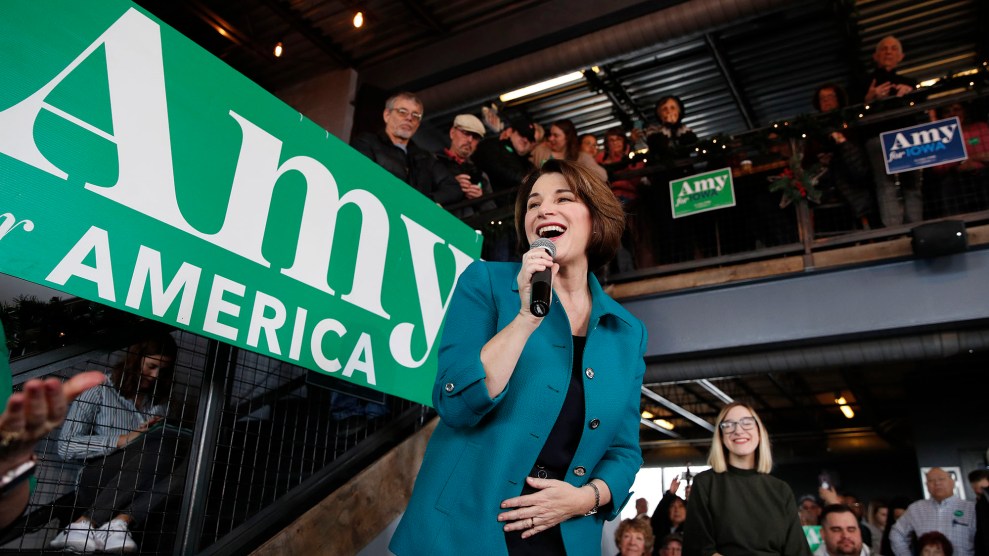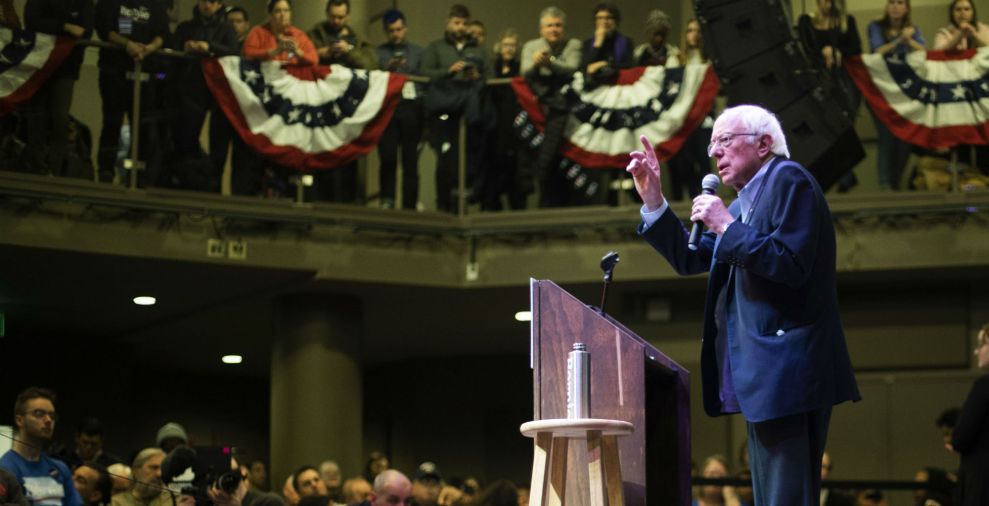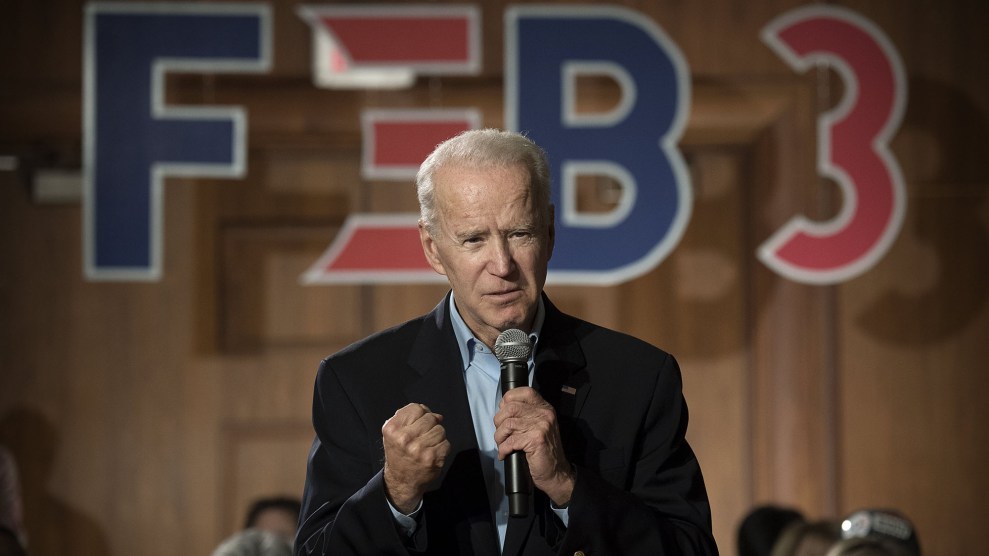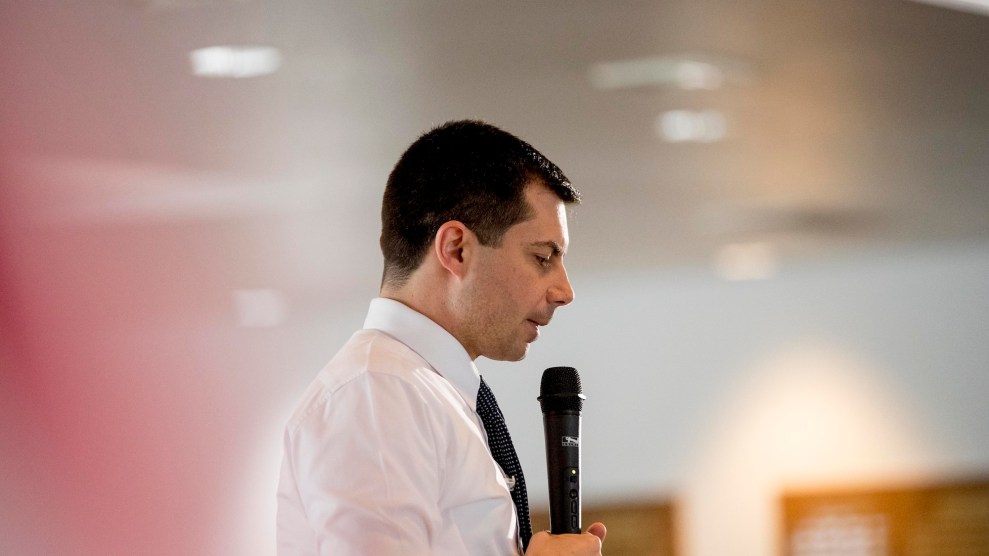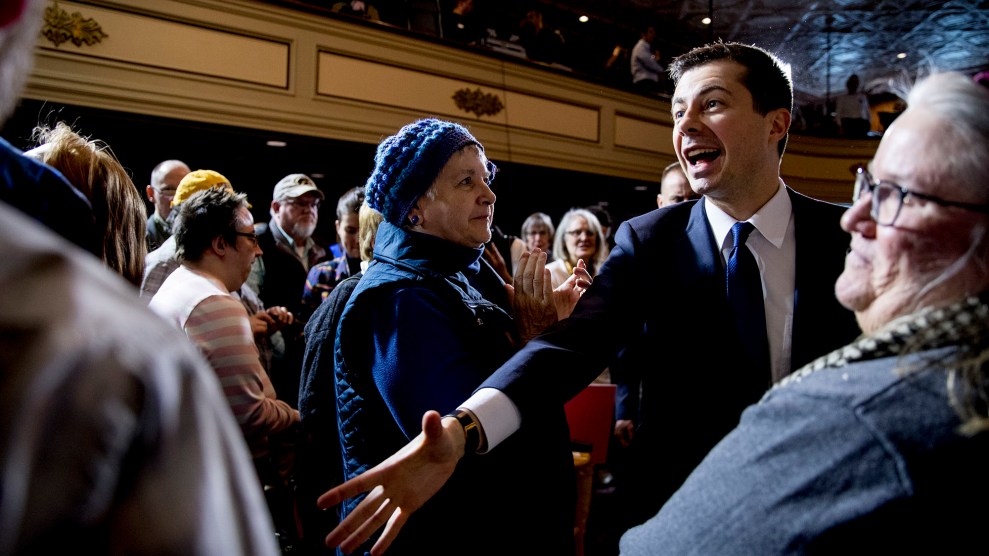
Pete Buttigieg greets the crowd Hotel Winneshiek in Decorah, Iowa.Andrew Harnik/AP
Pete Buttigieg doesn’t often remind people that he’s running a historic presidential campaign. The 38-year-old former mayor of South Bend, Indiana, has emphasized an easy-to-like persona: a nice-guy Midwesterner with middle-of-the-road policies and a bit of Obama-style hope-and-change rhetoric. As he campaigns across Iowa ahead of Monday’s caucuses, he doesn’t make much of the fact that he’s the first openly gay candidate with a serious chance of being the nominee of a major political party.
That Mayor Pete’s sexuality isn’t a primary point of conversation in the 2020 race is a remarkable testament to how much LGBTQ rights have progressed over the past decade. And it’s even more striking in Iowa, where Buttigieg has centered his campaign on winning smaller, rural counties, places that just a decade ago were the epicenter of anti-LGBTQ sentiment in the state.
In April 2009, six years before same-sex marriage was legalized nationwide, the Iowa Supreme Court issued a unanimous ruling in favor of it. The case, Varnum v. Brien, made Iowa the first state outside the liberal coastal enclaves to legalize gay marriage. Only Massachusetts and Connecticut had marriage equality at that time. (California had briefly legalized gay marriage thanks to a court ruling, before voters approved a constitutional amendment in 2008 banning it.) While it might have seemed out of step for Iowa to be at the forefront of the issue, as I wrote for the American Prospect in 2011: “The state also has a history of extending civil rights earlier than the federal government. In 1839, the Iowa Supreme Court’s first opinion granted citizenship to a slave when he entered the territory from Illinois. Iowa had desegregated its schools by 1868; a year later, it became the first state to admit women to the bar.”
Beyond checking off another state for activists, Iowa represented something different from the previous victories, a test case for how marriage equality might be accepted in the more rural parts of the country.
It didn’t go well at first. In Iowa, state Supreme Court judges are subject to judicial “retention” elections, a yes-or-no vote on whether a judge should keep their seat on the bench. Prior to Varnum, these had been staid elections. Judges didn’t run any sort of political campaigns to keep their jobs, and in the five decades the system had been in place only four judges, each accused of malfeasance at work, had lost a vote. But three months before Election Day 2010, Bob Vander Plaats, a leading figure of the state’s evangelical right, launched a campaign on the steps of the state capitol, pushing voters to say no to three of the Supreme Court judges up for retention that year thanks to their vote on Varnum. Vander Plaats’ efforts were boosted by a string of right-wing national groups—the American Family Association, the National Organization for Marriage, and the Family Research Council—with nearly $1 million spent to fund TV ads and a bus tour for the sort of race that typically had zero dollars in campaign cash. Each of the three Varnum judges lost.
Buttigieg doesn’t ignore Varnum, but he doesn’t spend much time at his events dwelling on the trailblazing aspect of his campaign. At a Thursday morning rally in Decorah, a small town in the upper northeast corner of the state, he didn’t make any reference to his sexuality until the last minute of his prepared remarks. When I saw him at his next event 60 miles south in Independence, he excised that aspect as intro instead using it as his closing note at the end of the Q&A portion.
In both instances, he spun out that detail in the same fashion: “Iowa has this beautiful capacity for showing what can be done for people who aren’t quite sure,” he said in Decorah. “I was a volunteer—first time I ever came through Iowa, first time I set foot in this state, they sent me to Creston as a volunteer on the Obama campaign in 2008. And I was here in Iowa when this state changed what the country and world thought was possible in American presidential politics. And then, about a decade ago, I wasn’t here to see it, but I was watching from where I lived, when this state gave me permission to believe that someone like me could be wearing this wedding ring that I’ve got on right now.”
If you’d asked political analysts five years ago if an openly gay candidate could capture a swell of support in Iowa, that wouldn’t have been unimaginable. But they likely would have assumed that said candidate had gained momentum through anchoring support in the state’s cities, the places already more friendly to same-sex couples before Varnum came around.
But if Buttigieg ends up winning Iowa, it’ll be thanks to places like Decorah and Independence. While Bernie Sanders and Joe Biden have worked to rev up voters in the state’s cities and suburbs, Mayor Pete’s closing push has been all about the rural eastern part of the state, places that flipped from Obama to Trump. That’s the case for both Winneshiek County—home of Decorah—which went for Obama by 23 percent in 2008 but which Trump won narrowly in 2016, and Buchanan County—home of Independence—which was +18 percent for Obama in ’08 before Trump won by 15 points. Buttigieg’s campaign boasts that the large audiences he is turning out draw from some of the the same crowd who voted for Trump four years ago. “I am meeting so many of what I like to call future-former-Republicans, who are determined to replace this president,” Buttigieg said in Decorah. “And they are more than welcome to this movement that we built.”
“He’s getting support in the areas where we lost the worst on marriage,” says Troy Price, chair of the Iowa Democratic Party, who I first met back in 2011 when he was in charge of One Iowa, the state LGBTQ rights group that had helped spearhead the lawsuit that legalized marriage. “It’s the suburban areas, it’s the rural areas, that’s where he’s doing really well.”
Back in 2012, after a month of crisscrossing the state to track the Republicans challenging Barack Obama, I stuck around after the caucuses to try to answer a question: In the three years since Varnum, how had legal same-sex marriage changed perceptions in small-town Iowa? Whether same-sex marriage could garner mainstream support at the time was still an open dispute. Barack Obama had so far stayed silent on the issue, and no state had legalized marriage through a popular vote (though both of those facts would change by the end of that year).
I traveled to Clayton County, which went heavily against the three judges in 2010, voting them out by double-digit margins. The county seat, Elkader, with a population of just over 1,200 people, draws tourist traffic during the spring and summer. There is little change in gradient to most of Iowa’s landscape except for the northeastern corner Elkader occupies, one of the few spots in this part of the Midwest that the ice age glaciers supposedly bypassed. Elkader is particularly scenic, lying in the base of a valley surrounded by Iowa’s best approximation of mountains. If you drew a line between Decorah and Independence, Elkader would be just a little east of the exact midpoint.
In Elkader, I met two men in their 80s who had moved to the town before the court decision, but married shortly after Varnum. They told me they hadn’t encountered much backlash, and continued on with their lives, still volunteering at the small local museum with no trouble. “You can do the same thing in a big city, but that’s because in a big city you’re anonymous,” one of them told me. “Well, nobody is anonymous here, and that’s what makes it very gratifying. That you are known.” The small stretch of downtown was anchored by an Algerian restaurant run by a young gay couple, one of whom, Brian Bruening, now runs the county Democrats. When I stopped by a Saturday evening mass at the local Catholic church, the woman who served as the cantor was married to another woman. “We don’t all have the same faith and we don’t all walk the same way,” the church’s 77-year-old priest told me after the service, explaining why his congregation should make a concerted effort to reach out with an open heart to those who might have different views.
“The hearts and minds of people started changing so quickly on it, once they started seeing couples getting married,” Price says. “That was always the plan when they started down this path of the lawsuit in ’05, if we can get it in Iowa it will spread everywhere, because it’s not just an east coast or west coast thing.”
To be sure, not all was rosy. Some parents were still wary to let their children around gay and lesbian couples. The pastor at the evangelical church on the outskirts of town was far less welcoming. “If you want a church that will proclaim that homosexuality is ok, and that same-sex marriage is ok, if you look long enough, you’ll find one,” he told me back then. “They won’t follow the word of God as it’s written.” But even he acknowledged that it wasn’t so clear cut. “It’s one of those subjects where everyone wants to be accepting of everyone, but we can’t compromise God’s truth for that.”
But it was clear that those interactions might slowly melt away the hate as time went by. “Being at One Iowa in 2010 and 2011,” Price says today, “not only were there people still hesitant because of what happened with the judges, there were people bitter that it was ‘our fault’ for pushing that lawsuit and putting us in this position, that we would have won all this stuff if it hadn’t been for Varnum. By 2015, when the US Supreme Court ruling came out, [the politics of marriage equality had become] a positive out there. You could feel it, you could see that out there. It just moved really quickly after 2010, it just moved really fast.”
Buttigieg swung by Elkader last September. “The most important, best thing in my life, my marriage, only exists by the grace of a single vote on the US Supreme Court,” he said in his remarks. “And by the way, thank you Iowa for what you did to bring about marriage equality in the United States.” He’s earned the support of Bruening, who said in his endorsement, “I’m with Pete because I see a better future in him—a better America and a better world.” Bruening told me that Buttigieg drew the biggest crowd of any of the Democrats and that perhaps about a third of the attendees were people who have voted Republican. “That he’s married to a man,” Bruening says, “is so not an issue.”
Buttigieg’s hesitancy to make too much of his place as a first in presidential politics hasn’t exactly engendered good will from some activists in the LGBTQ community. Last week, Iowan Lyz Lenz wrote a piece for Gen headlined “What Pete Buttigieg Doesn’t Understand About LGBTQ Life in Iowa,” in which she explained how, while marriage might be a more settled issue, there are still plenty of equality fights in the state, and the local community wasn’t fully behind Mayor Pete.
But the fact that Buttigieg’s allyship is quieter, that his marriage to Chasten Buttigieg would be a boringly bland political marriage were it not for their respective genders, might be what helps normalize his relationship for these rural communities. “The fact that he’s palatable to middle America,” Bruening says, “is why he’s popular in Iowa.”
“If you step into some of the smaller towns, the more rural towns, you can hear the slurs used as a casual form of language, but the young people today are much more open to letting people live their lives however they want,” Dan Callahan, the chair of the Independence County Democrats, who had introduced Buttigieg, told me after his event in Buchanan county last week, as George Michael’s “Freedom” played over the loud speakers to usher out the crowd. “There’s a lot of these older people here today. They’re the same way. ‘What you do doesn’t affect me, so I’ll let you do it, if you let me do what I want.’ That’s a lot of what Iowa is all about.”
As much as rigid gender norms loosened nationally in the 2010s, people across the LGBTQ spectrum still face plenty of discrimination, and things haven’t progressed nearly as far on trans rights as they have on marriage equality. Just last week, a group of nine Republicans in the state legislature, including the representative for Clayton County, introduced a bill that would have stripped trans protections from the Iowa Civil Rights Act, but the Republican in charge of the relevant committee quickly killed the provision. “It’s one of those issues,” Price says, “that has moved so quickly and become such a non-issue for most people’s minds that when the Republicans do start talking about it, they get immediate pushback.” Should Iowa send Mayor Pete forward as its top choice against Trump, it doesn’t mean the state is absolved of any lingering homophobia, just as Barack Obama’s win here in the 2008 caucuses didn’t mean racism was solved in the Hawkeye state.
But the fact that Pete is even a competitive candidate, and that the main reason he has a chance is thanks to the small towns that just a decade ago would have been highly judgmental to someone like him, is a quiet success story—one of the few political bright spots of the Trump era.
“There’s a lot of people here who are probably still uncomfortable,” Callahan told me. “But it doesn’t mean they’re going to treat you different, or do anything differently. And they’re certainly not going to vote to support those kinds of actions.”

